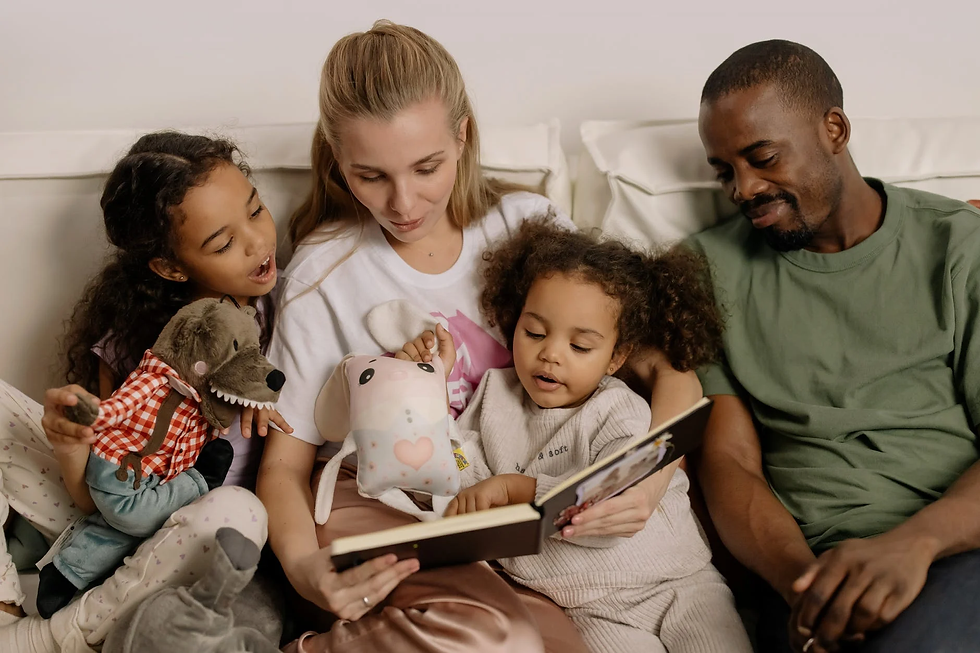6 Ways Parents Can Protect Kids from Child Sexual Abuse
- Elijah Ugoh

- Feb 2, 2022
- 4 min read

According to the Centers for Disease Control, approximately 1 in 6 boys and 1 in 4 girls are sexually abused before 18. That's tough to swallow, and you may choose to look away. But the problem won't go away if we choose not to act.
Parenting comes with highs and lows. But by and large, one of the lows or rather uncomfortable conversations that any parent would ever have with their child is on any abuse-related topic. It's literally the elephant in the room. Your child dreads broaching the subject, and you are not even sure how to begin addressing the issue when faced with it.
But you know, learning of and addressing issues of child sexual abuse in your family is just one side of the coin. The other side is even more dreadful. I'm talking about cases where child sexual abuse goes undetected until serious harm has been done to the child.
Yes, not every child will be courageous enough to speak up. So the most important effort you'll need to make in this regard is to make sure your child is protected from internal and external abuse. While this is understandably challenging, there are ways of handling it. In this article, we'll highlight important measures that every parent can take to protect kids from sexual abuse.
1. Talk to your kids about sex, body parts, and family values
Experts believe that the earlier your child learns about sex the right way, the easier it is to save them from the impacts of wrong exposures. You may find it embarrassing, but the best time to educate them about sex and sexual abuse is during their early years, given the times we live in.
Let them know the parts of their body that friends, siblings, uncles, cousins, and others can and cannot touch, and why. Most children find it easier to open up about abuse when they understand the dangers. In the home, help your kids understand the difference between privacy and secrecy. Abuse thrives in secrecy. Use as many teachable moments to educate them about family values, what's acceptable, and what is not.
2. Be more involved in the life of your teenager
Teenage years are when they are more exploitative than ever. They want answers, they feel they're right many of the time, and the hormones are constantly surging. Sometimes, we see older children abusing younger ones. Nearly 40 percent of child victims are abused by older or more powerful children. This often does not mean they're pedophiles. Many of them are misguided and influenced by the culture around them.
If there's ever any time in your kid's life when they need guidance the most, it is during their formative years. If we trace the issues, you'll realize that much of it is related to exposure to pornography, peer influence, and movies. This offers suggestions on how and where parents need to start when dealing with these issues.
3. You can't keep your child in a bubble forever
Regardless of how much you shield them from the outside world, they'll still see sexually arousing content, one way or another. It is better they're psychologically prepared for this exposure than when they're not. If parents fail to teach their kids, then they're relinquishing that privilege to the world around the child.
Instead of reducing television time, disallowing partying and outings, or discouraging the use of smartphones (not that these are not helpful when necessary), why not focus on teaching them the rights from the wrongs? Teach them about arousal and help them understand the feelings that flood their emotions.
4. Pay attention to who your kid is spending time with
Many times, your kids will spend considerable one-on-one time with other people. It could be a teacher, a coach, a friend, the uncle living with you, or the neighbor's son next door.
After they've spent that much time in the company of people you don't know very much, even if they're family members, try to find out what they spent time doing, but don't make it interrogative. For starters, you can ask questions like, " So did you have fun today?", "Would you like to go out again with uncle David?", "Who else was there with you guys?"
Keep the line of communication open, and remember that 60 percent of child victims are sexually abused by trusted family members. Keeping in touch this way will help you detect foul play so you can't act fast before things get bad.
5. Learn the sign of child sexual abuse
Child sexual abuse and, indeed, all other forms of trauma manifests in different ways. It could be withdrawal from conversations, reduced self-esteem, inability to articulate their challenges, and several other signs.
You may not be able to pinpoint the issue right away, but if you notice a disconnect from your child or unhealthy or unusual behavior, trust your guts and dig deeper. That could be a sign that your kid is suffering abuse.
In some cases, with the right care and attention, and under the right atmosphere, your kid will likely tell you before the situation gets out of hand.
6. Involve a professional if you're sure what to do
By all means, avoid interrogating your child if you suspect an abuse situation, especially if they're not willing to open up. But if your kid or teens are bold enough to discuss their challenges with you, the most important thing you can do is assure them of protection. Let them understand that you believe them and that they're safe.
Involve a professional if necessary because interrogations will only make your child relive the trauma. An expert knows what to say and the right questions to ask.
About the Mission Haven
We are committed to building communities where every child can simply be a kid. We're equally positioned to ensure that children faced with abuse can access timely help.
The Mission Haven runs a fully-equipped shelter that takes in and caters to the mental, social, and economic needs of kids and teenagers who have been exposed to all forms of sexual abuse, including commercial sex exploitation and sex trafficking. To give, volunteer, or become a partner, please contact us today.




Comments